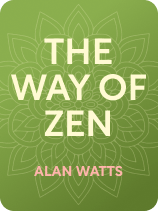

This article is an excerpt from the Shortform book guide to "The Way of Zen" by Alan Watts. Shortform has the world's best summaries and analyses of books you should be reading.
Like this article? Sign up for a free trial here.
Should you learn Zen? What impact can it have on your mind and, ultimately, your life?
Alan Watts contends that expressing the principles of Zen benefits you by helping you break down the mental barriers that divide you from the rest of the world. Experiencing Zen lets you finally see the world and the present moment for what it is.
Keep reading to learn why you should learn Zen, according to Watts’s classic book on the subject.
The Benefits of Zen
Watts discusses how Zen benefits you even in today’s world and explains what changes you might experience by expressing Zen in your life.
Zen Is Still Relevant
One reason to dedicate time and attention to learning the principles of Zen is that they’re still very relevant. Watts writes that, though Zen arose in a time and place that’s very different from what people experience in the West today, it can still help you learn some kinds of knowledge—and unlearn other kinds.
Because of its teachings about the nature of the world and your perception of it, Zen can help you see what’s false and artificial in your view of the world. Watts points out that your consciousness is only superficial—just one function of your true mind—and can only attend to a small part of reality at a given time. He notes that you can access a more holistic view of the present and the world if you practice the principles of Zen.
(Shortform note: Scientists are still figuring out how your consciousness arises from your brain and enables you to experience the self that, as Watts explains, determines how you perceive life. A centuries-old explanation is “panpsychism,” the theory that consciousness is universal and emerges from matter. Another theory is that a state of matter called “perceptronium” enables atoms to process information and create subjective experience. In Homo Deus, Yuval Noah Harari points out that scientists know very little about consciousness, and the dominant theory is simply that consciousness is a byproduct of neural processes.)
Zen Lets You Experience the World Differently
Another reason to learn from the principles of Zen is that you’ll notice changes in the way you experience the world when you adopt Zen ideas in your life. We’ll explain what these beneficial changes can look like.
You Can Feel Liberated From Constantly Trying to Improve Yourself
The first change that Zen can help you make is to curb your innate desire to constantly improve yourself or your situation. Watts explains that this improvement is often an illusion of dualistic thinking—an illusion we can stop buying into to end the cycle.
He writes that we apply the same dualistic (and mistaken) pattern of thinking when we conceive of good and evil or pleasure and pain as opposite states. When you see that not only can one not exist without the other but that you can’t experience one without the other, then you stop striving against inevitable experiences like discomfort, pain, and frustration.
(Shortform note: The Zen principle of the relativity, rather than the dualism, of states like pleasure and pain informs many ideas about the human experience. In Inciting Joy, Ross Gay writes that it’s a “fantasy” to imagine that any emotion is separate from the others. He explains that joy isn’t the exclusion of pain or sorrow but fundamentally entangled with pain and sorrow. Joy is also what emerges when we take care of each other through suffering, sorrow, and pain, demonstrating how it’s impossible to experience one without the other.)
You Can Feel Interconnected With the World, Rather Than at Its Mercy
A second change that Zen can help you make in your life comes when the practice reorients you to your relationship with the world. Watts writes that seeing beyond dualistic thinking can help you recognize that you aren’t as separate from the world as you think. While you think of your “self” as an entity separate from your body and your experiences, Zen teaches that those distinctions are artificial. Your idea of yourself is not your true self: It’s an abstraction you’ve constructed to feel security and sameness from one moment to the next.
Letting go of the abstract image you have of yourself can help you stop feeling that what happens to you is out of your control. It can also help you recognize that even voluntary and involuntary events are relative. Watts writes that when you experience the world in its “suchness,” you don’t experience it as an obstacle or as something that you need to control, but as something with which you’re interconnected.
(Shortform note: The realization that you’re part of the universe may be a crucial one. In Radical Acceptance, Tara Brach writes that the Buddha is said to have attained enlightenment when he realized that all of his suffering originated in a false belief that he was separate from the rest of the world. According to Brach, it was his sense of “selfness” that caused him to constantly chase the things he thought he wanted and run away from the things he feared, mistaking the universal human condition of suffering as something that was specific and personal to him.)
You Can Live in the Present—Because There Isn’t Anything Else
The third way that Zen can help change your perspective comes when a Zen understanding of relativity changes your relationship with time. Watts explains that learning to recognize time as relative can help you feel more still and calm no matter what’s happening. When you’re worried about the passage of time, it just seems to pass more quickly. But when you stop trying to hold onto it, its pace seems to slow.
Watts writes that a major idea of Zen is that you don’t have anything except the present moment. He explains that to Zen, the past and future are just abstractions, and the only moment that has any concrete reality is the one you’re living in right now. As long as you don’t label this moment the present—which implies that it’s separate from the past and from the future—then you can be awake and alive to just this moment.
(Shortform note: In The Power of Now, Eckhart Tolle writes that the past and the future exist only in your mind, and now is the only time that truly exists. He explains that the past is just memories, and the future is just speculation. According to Tolle, stress is caused by living in the future—always anticipating or worrying about what will happen—rather than living in the present. Though it’s common to feel stressed about the future, Tolle writes that you can eliminate the stress by staying present in the now instead.)
Exercise: Be Present in the Moment
A core idea of The Way of Zen is that we live in an illusion of the world, rather than perceiving the world as it actually is. One way that we do that is by dwelling on the past or the future, instead of living in the present moment.
- Think of a recent time when you were so distracted by something that happened in the past or something that you anticipated in the future that you weren’t tuned in to the present. (Maybe you were so focused on worrying about work that you almost missed your subway stop, or maybe you were replaying an uncomfortable conversation instead of listening when your partner described their day.) Describe what was going on in the moment and what you missed while you were distracted.
- Next, remember what you were distracted by, and why it felt so urgent at the time. Write it down here.
- Finally, think about how, if you found yourself in the same situation again, you would refocus your attention on the present moment. (Continuing the examples above, maybe you would direct your attention to the view through the train windows, of all the stations you pass through, to redirect your attention to the present. Or perhaps you would tune in to the tone and timbre of your partner’s voice to gently bring your focus back to the conversation.)

———End of Preview———
Like what you just read? Read the rest of the world's best book summary and analysis of Alan Watts's "The Way of Zen" at Shortform.
Here's what you'll find in our full The Way of Zen summary:
- The major principles and history of Zen Buddhism
- How to experience Zen in everyday life—without a strict meditation practice
- Why calling Zen a "practice" is a mistake






